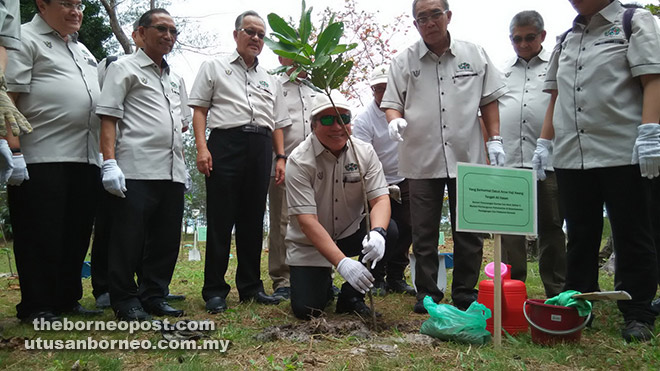Awang Tengah says Sarawak determined to create a balance between ecological, economics and conservation

Awang Tengah plants a tree to mark International Day of Forests.
BINTULU: The state government will always uphold its policy of sustainable forest management (SFM).
Second Minister of Resource Planning and Environment Datuk Amar Awang Tengah Ali Hasan said this is vital to create a balance between ecological, economics and social dimension of sustainability with strong consensus among stakeholders, cross-sectoral approach and partnership.
According to him, under the SFM initiative, forest certification is one of the important components in ensuring the success of forest sustainability and proving that the area has been sustainably managed.
He was speaking at the state-level International Day of Forests 2017 themed ‘Forest and Energy’ at Similajau National Park near here yesterday.
He said Sarawak has a landmass area of 12.4 million hectares, with 65 per cent of the land area still under forest cover which is more than the national target of 50 per cent.
“We have set a target for at least seven forest management units to be certified this year,” he said.
He added that the state government under the leadership of Chief Minister Datuk Amar Abang Johari Tun Openg was committed to protect and preserve the forests for the benefit of the present and future generations.
“In relation to that, we have set a target to establish one million hectares of land as Totally Protected Areas (TPAs) for conservation and six million hectares of land as Permanent Forest Estate (PFE) which will be managed sustainably to ensure sustainable supply of timber for our industry,” said Awang Tengah, who is also the Minister of Industrial and Entrepreneur Development, Trade and Investment. The government, he said further, had also embarked on Industrial Tree Planting (ITP) with a target of one million hectares of fast growing tree species as an alternative source of timber as well as for forest and soil rehabilitation and amelioration.
“This is also to ensure that we are not dependent on natural forest for our sustainable supply of raw material for the industry,” he pointed out, adding it is important to mainstream the Research and Development (R&D) of fast growing species apart from acacia tree especially for species that can be commercialised.
In this respect, he said the government had issued 42 licences for planted forest (LPF), with a gross area of 2.57 million hectares.
However, he noted that only approximately 383,244 hectares of the area had been planted, far behind the one million hectares targeted.
“Due to slow progress, the government will review the current policy of forest plantation,” he said, adding the LPF holders had been warned.
He suggested that sections of the LPF area that are not plantable due to rugged terrain be gazetted as TPA.
“As of today the forestry sector still plays a prominent role in the social and economic wellbeing of the people in Sarawak,” he said.
On a related matter, Awang Tengah said for the last 10 years the average revenue collected from timber was between RM500 million and RM700 million annually, while the average export earning for timber products was about RM7 billion a year, proving that the forestry sector is still a very important indicator of the state’s economy.
“This sector continues to provide direct and indirect employment for 100,000 people in Sarawak,” he said.
He pointed out that the state could gradually stop exporting logs by adding value to its resources for downstream activities through R&D.
To meet sustainable forest management goals, he said the state government cannot operate in isolation and collaborations between academics, industrial players and policy makers including non-governmental organisations (NGOs) are essential.
Present at the ceremony were Assistant Minister for Environment Datu Len Talif Salleh and state Forest Department director Sapuan Ahmad.
